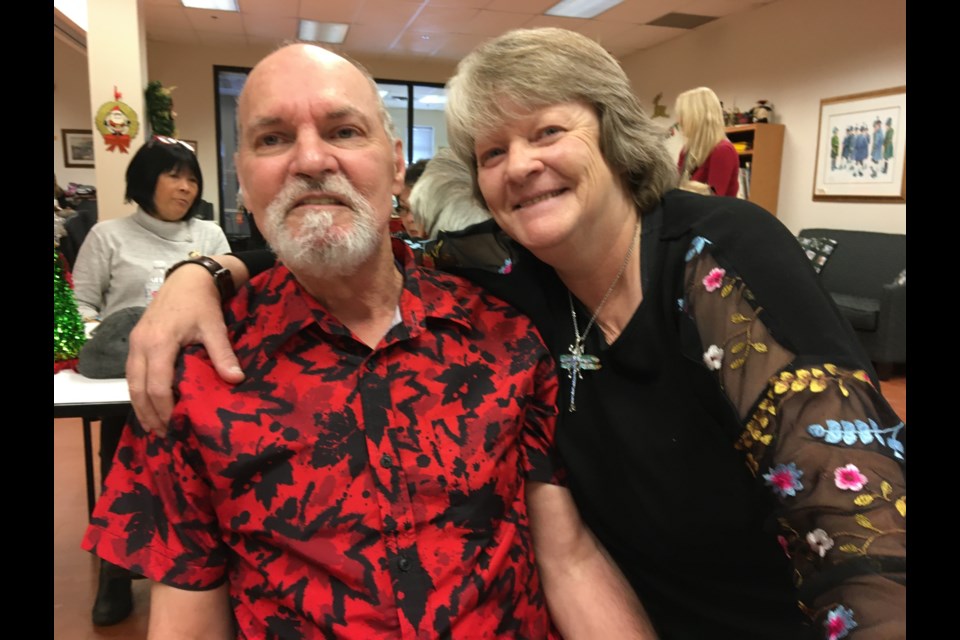“Please reach out with phone calls, texts and emails: anything that makes me smile or laugh, or that shows the good in people around the world.”
This the request from Jennifer Dance Bowen, the primary caregiver of her husband Feroze Mohammed, who is living with Alzheimer's disease.
Her comments echo that of many York Region caregivers: while COVID-19 makes social distancing necessary, for the safety of themselves and their family members, it also makes a journey already lonely and isolating, even more so.
In addition to missing face-to-face meetings and get-togethers with family and friends, Dance Bowen said she is also missing the Alzheimer Society of York Region (AS York)'s DAY programs, which are closed due to COVID-19.
DAY programs offer social stimulation to people living with dementia (PLWD) and respite for their caregivers. Feroze attended the Stouffville DAY program three days a week.
“He can’t be left alone so this respite (DAY program) gave me time to be ME, instead of a full-time caregiver. I was able to write, or read, or just think, for example, without interruptions.”
Jean Cooper, whose husband Tom lives with young-onset dementia, is also missing the DAY program for the respite needed to deal with her chronic pain and the annoyances that come with someone living with dementia, including sundowning, when PLWD are restless at night and unable to settle down.
“When Tom is at the centre, it is eight hours of being able to de-stress and know he is being well taken care of. I need time to recharge my battery, spend quality time with my heating pad and...escape reality in a short nap. Tom is missing rides in the van with his buddy, Patrick (driver), all the wonderful people that work so diligently and with such care and loving passion at the DAY centre and, of coarse, the delicious food.”
Jean said she tries to keep Tom socially stimulated to keep him in the present. She talks with friends and family, putting the phone on speaker so Tom can join in.
“Dementia is a lonely journey and social distancing is certainly adding to that...I would advise people impacted by dementia to continue to reach out to family and friends, and perhaps even people they don't know yet. Think charity. What can l do to help as it will make you feel better having done so. Right now people can help each other during this time by taking care of someone other than themselves.”
Cynthia Wallbank said she and her siblings recently moved their mom, Shirley, who lives with mixed dementia including vascular and probably Alzheimer's disease, into a long-term care home, which is no longer accepting visitors.
Several times a day Wallbank gets calls from her mom in various states of “altered reality,” seeming sad, abandoned and desperate to “get out of here”.
For Wallbank, the inability to be there for her mom is the worst part about this current crisis.
“I can’t mitigate her confusion. No matter how much we try over the phone, she is unable to understand.”
Wallbank talks with her mom over a photo phone (this phone offers one button dialing with a person's picture attached to the number) and tries to keep cabin fever at bay by connecting with friends and family through phone and video calls and social media. She encourages people to get outside and exercise and keep themselves healthy.
“Staying healthy ourselves means we can put full effort into helping our loved ones living with dementia.”
Renu's husband Inder, who was diagnosed with frontal lobe dementia, which causes behavioural changes among other things, lives in a private retirement home, which has stopped visits.
“He is angry and confused, not sure why we are not responding or complying to what he is asking of us. To reason is difficult.”
Renu said she feels guilt, lonely, frustrated and helpless and prays that her husband will stay safe.
Deb Copithorn, whose husband Rocky lives with frontotemporal dementia/young-onset dementia and lives in a care home, said she, too, is missing the socialization and reaches out to family and friends using video and phone calls as well as Messenger. She asked people to stay connected, be patient and appreciate those who are working to help us during this difficult time.
Wallbank agrees.
“Everyone needs to have patience and determination and look after themselves and each other and we will come out the other side with a new understanding of what is important over all.”
The Alzheimer Society of York Region has cancelled DAY programs, support groups and closed its offices in Thornhill, Stouffville and Aurora. However, people who need information, referral and support are encouraged to connect. Email [email protected] or call 905-726-3477.
Lisa Day is the communications and fund development coordinator at the Alzheimer Society of York Region.



